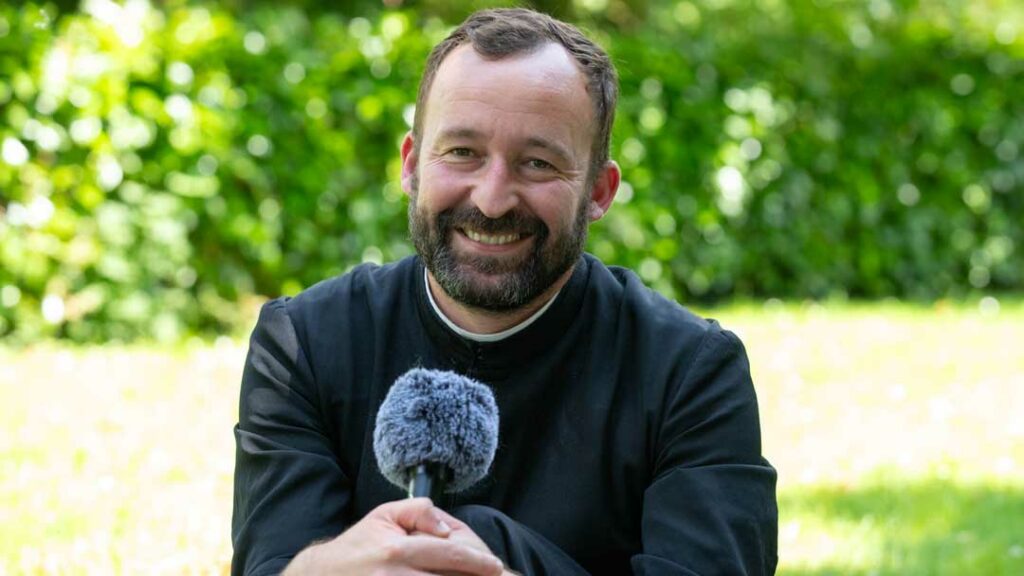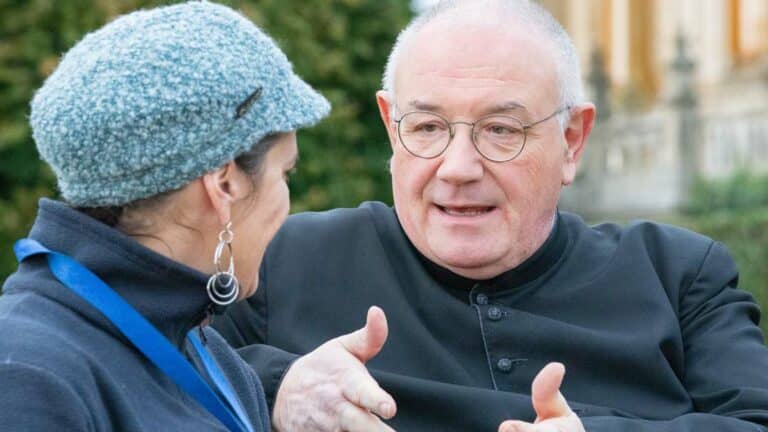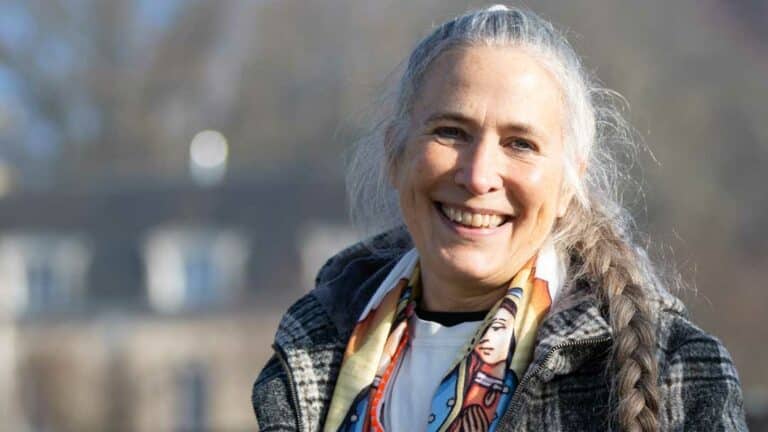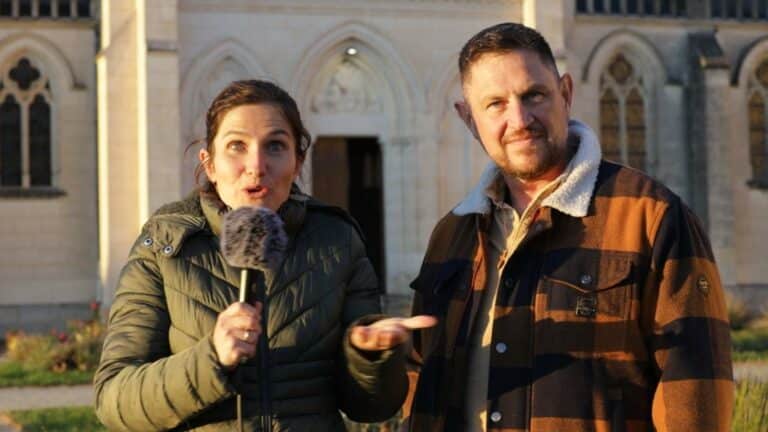Who are the angels? Where do they come from? What do they do? In Le Roman des anges [The Novel of Angels] (Salvator, 2024), Don Pierre Doat, Rector of Mont Saint-Michel, explores these invisible creatures. In this interview, he encourages us to rediscover their role in Christian faith, reminding us their discreet but real presence at our side.
An interview by Amélie Le Bars for Chemin d’éternité No 325 with don Pierre Doat, rector of the Mont saint Michel sanctuary and author of Roman des anges? (published at Salvator 2024).
Angels have three different roles
“An angel is first and foremost a creature.” Don Pierre Doat chooses to start with this simple statement in order to dismiss any misunderstandings. In collective imaginary, people sometimes picture themselves angels as almost divine beings, floating in a remote world, inaccessible to man. Now, the Christian tradition is clear: angels are creatures, just as we are, created by God, meant by Him and called to serve Him.
Angels share a common vocation with us: to know, love and serve God.
This starting point is key. It focuses our reflexion on what angels have in common with us, humans. “Angels share the same vocation as ours – to know, love and serve God.” This threefold mission forms the basis of any spiritual life. Therefore is is not an abstract topic. Talking about angels amounts to talking about our vocations of men and women called to sainthood.
Of course, there is still a major difference, since angels are spirits whilst we are corporeal beings. We have an immortal soul as well as a mortal body. Whereas angels are purely spiritual. They have no bodies. Therefore they do not experience death as we do. Far from setting us apart from them, this distinction make their presence even more mysterious and discreet.
Angels protect, announce, accompany and instruct. They are messengers, of course, but also guardians, guides and fighters.
Why did God create angels? To serve his purpose of love. “The mission of angels is to serve God’s plan of love for all his creation, both visible and invisible. They do not exist just for themselves. Their existence is turned towards God, but also towards mankind, towards the world, which they silently support. They have a number of different missions of service. Angels protect, announce, assist and instruct. They are messengers, of course, but also guardians, guides and fighters.” Don Pierre stresses that fact: “They don’t stand center stage, but they play a key role in the history of salvation.” Their role, though discreet, is essential in God’s plan.
In this regard, he mentions a witty comparison borrowed from Father Serge-Thomas Bonino, dominican and theologian: “Angelic organization is like a communist administration ––except that it works”. A very dense hierarchical structure, where everyone has their place, their mission, their function, without confusion. Cherubim, Seraphim, Thrones, Dominations… nine types of angels are traditionally listed, each with a very specific role.
Nine types of angel, three mission categories
We have been willed by God, and God wants something from us. Understanding what we are meant to achieve is our particular challenge in life. Likewise, God has planned a mission for each angel. Your guardian angel has one mission, taking care of you. Apparently, he has none other.
According to the tradition of the Church, there are nine types of angels and three categories of missions entrusted to them by God. Far from being interchangeable performers, they are sent to fulfill specific tasks in the service of God, creation and humanity.
We have been willed by God, and God wants something from us. The challenge of our lives is to understand what we are meant to achieve.
The hierarchy of angels is established according to their closeness to God:
- seraphim,
- cherubs,
- thrones,
- principalities,
- dominations,
- virtues,
- powers,
- archangels
- angels.
First mission
The first mission is direct service to God. This image is found in the Book of Revelation: angels praising God ceaselessly and celebrating the heavenly liturgy. The epistle to the Hebrews mentions those liturgical beings who “spend their time in prayer” and are “at mass”.
The hierarchy of angels is established according to their closeness to God: seraphim, cherubim, thrones, principalities, dominions, virtues, powers, archangels and angels.
Second mission
The second type of mission is the service of visible creation. These are the angels who participate in supporting the cosmic order. Don Pierre recalls a funny depiction of an angel pushing the planet Mars: “There isn’t really an angel pushing Mars, but it does match a spiritual reality: God supports all realities through his Providence, and he does so also through angels.” Cardinal Newman even used to say that what we call the laws of nature, physics or astronomy, could be seen as the silent work of angels.
Third mission
Finally, the third mission is to serve humanity. Archangels (Michael, Gabriel…) and guardian angels fall into this category. They attend individuals, guiding, protecting and supporting them in their relationship with God. Each mission is tailored to the reality it serves – either divine, cosmic or human. Three archangels are known by their name: Michael, Gabriel and Raphael.
Myriads of angels, all different
As opposed to popular belief, angels are not an army of clones. “Before I became interested in them, I imagined them like Star Wars clones : all identical and interchangeable.” Don Pierre evokes this image wittily, with a purpose of deconstructing it. In fact, the spiritual reality is much richer: each angel is unique, personal, with their own identity and mission.
The same applies to their relationship to the world. Not all are guardian angels. Some are attached to places, others to particular missions. Angels are not characters in a setting. They are involved in reality, in history, in our very lives.
“There are angels everywhere, in every dimension of human life. In this multitude, God manifests his infinite creativity. Angels are neither useless nor decorative. Their purpose is not to look pretty, but to act, to help, to enlighten.
Free and virtuous… although not all of them
Good angels do only good, while fallen angels do only evil, seeking to turn man away from God. They can ape the good to convince us to trust them. In the same way as for us, God has a mission planned for each angel. Take your guardian angel, for example: his sole mission is to take care of you as well as your relationship with the Lord.
Each angel possesses all the virtues necessary for the mission God has entrusted to them. “My guardian angel, for example, doesn’t necessarily have the same qualities as yours,” he explains. If a person is proud, their guardian angel will have the necessary virtues to help them progress towards humility. “There is no obstacle in them to the love of God,” adds Don Pierre. That’s why they’re always faithful to their mission. They don’t have all the qualities, but they possess and exercise perfectly those given to them. Above all, they have no faults.
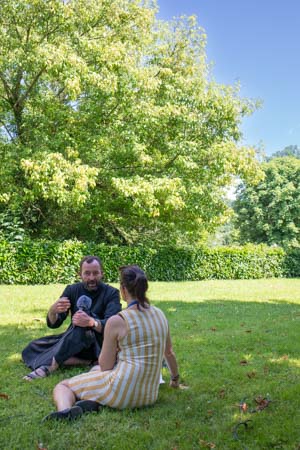
Angels and freedom
On the other hand, angels are free, but their freedom is completely different to ours. We often mistake freedom for the ability of doing evil. But this definition is incomplete, if not false.” A husband is not free because he can cheat on his wife; he is free because, day after day, he chooses to be faithful to her”, without losing any of his freedom. So he will be free to love his wife, always doing good. The day he becomes a slave is precisely when he cheats on her. At that particular moment, he becomes a slave to his passions, a slave to a love to which he has no right. The same is true of angels. Their freedom unfolds fully in goodness, in compliance to God’s will. They never act against Him, not out of compulsion, but because they are perfectly oriented towards the Good.
Also, unlike us, they don’t regret their mission and make no envious comparison: “Guardian angels do not think they would have preferred attending another human being. They give their all to the person God has entrusted them with. Which means that their freedom is the freedom of love, of compliance and perfect faithfulness. This is a model for us, and an encouragement to rethink our own view of freedom.
Angels and time
For this reason, they are neither completely in eternity nor in material time. If they were in eternity, they could not intervene in the world. And since they don’t have bodies, we can’t physically locate them. But their presence is real. “They are where they act,” says Don Pierre. They are located by their will, not their bodies. So our guardian angel is truly with us, present, active, invisible but real.
The guardian angel
,Quite often, this is the first image encountered by a child: a well-meaning angel, protecting her and watching over her sleep or her steps. However, this is not a pious fiction. “The gardian angel is not a children’s tale. It is a theological reality.”
According to Church tradition, each person receives an angel at birth. This angel accompanies the soul throughout its earthly life. Like the Holy Spirit, he watches over, advises and protects. And even after death, he remains with the soul in anticipation of the resurrection.
However, the guardian angel does not replace human freedom. “He will never act against our will.” He suggests, inspires, warns, but does not coerce. Cooperation between man and his angel presupposes listening, acceptance and trust.
Don Pierre encourages us to reconnect to this spiritual relationship: “We can talk to him, pray to him, ask him questions. He’s a faithful friend, discreet, but always at our side.” Especially in times of hardship, loneliness or inner struggle, the angel can become a valuable ally.
My angel,
my inspiration
“My guardian angel never appeared to me”. Don Pierre Doat admits it straight away: although his angel is indeed present, he has never visibly manifested himself. But that does not mean he doesn’t act. It is just that angels usually intervene from within, from the very depths of the soul, by way of inspirations, like the Holy Spirit.
Some people — even non-believers — testify to extraordinary interventions, like being physically held at the edge of a precipice, feeling an invisible hand on the steering wheel… But these manifestations are not the norm. “This is not the ordinary way angels act,” he explains. Their mission is performed more discreetly, in the silence of the heart, by suggesting thoughts of peace, kindness and patience.
When we are faced with the frustrations of our daily lives — a noisy neighbour, a tense situation —, we are tempted to dream of a dramatic intervention by a vengeful angel armed with a sword. In fact, adds don Pierre with humour, this is not how our angel will proceed.” Rather than hitting, he will inspire gentleness. Rather than punishing, he will suggest to do good.
This relationship is actually reciprocal. You can talk to your angel, pray to him, ask for advice. It’s even a very fruitful spiritual exercise. “It helps us realize that our lives are not disconnected from the invisible world,” he explains. We sometimes live as if God and angels didn’t exist. But to pray to your angel is to make yourself available to his action. Even if the angel will act anyway, whether we invoke him or not, our prayer makes us more receptive, more attentive, more flexible to his inspirations.
In short, “prayer is not about wresting something from God”, concludes Don Pierre, “but about receiving what He already wants to give us”. And God often uses angels to make this gift to us.
Angels are the instruments of God’s grace
As Don Pierre Doat clearly reminds us, angels are the instruments of God’s grace, just like people or events. In the same way that a parent can transmit God’s love to a child, angels become mediators of that love. They act according to who they are, with their own means.
“Angels will act with their own means,” he explains. Sometimes this involves physical intervention, like holding someone back, directing a gesture, or even, according to some testimonies, preventing someone from leaving a sacred place. He cites the case of a man unable to pass through the door of a church until he had confessed. However, this type of intervention remains rare.
More often than not, angels intervene in our minds, through inspirations, unexpected thoughts, images or dreams. And these dreams are not to be despised, as long as they have been filtered by reason. Father Doat gives the example of Saint Aubert, founder of the Mont-Saint-Michel shrine. After dreaming twice of the Archangel Michael, who asked him to build a sanctuary, he had to have a third dream, accompanied by a clear sign (a dent in his skull), which finally triggered his decision.
He insists: “Don’t do every trick that comes into your head while you’re asleep, though.” Still, dreams can be a real channel of angelic inspiration, provided you exercise discernment. This was the case for St. Joseph, who made radical decisions — to welcome Mary, flee to Egypt, return to Nazareth — solely by putting faith in a dream in which an angel appeared to him.
“You always need to pass through the filter of reason, of your intelligence, of your will,” concludes Don Pierre. So God may speak to us through the angels, but it’s up to us to learn to recognize their voice and respond freely.
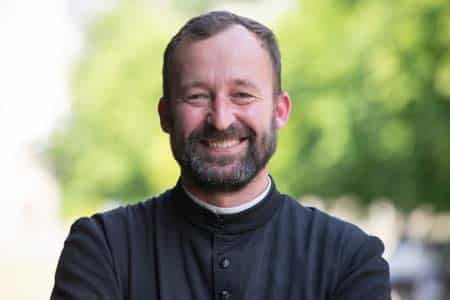
Educating to the invisible: the novel of the angels
For don Pierre, a major challenge is to transmit this spiritual reality to young people. “We need to rehabilitate the guardian angel in catechesis. Not as a fable, but as a real, personal, dynamic presence. It is a pastoral challenge: we must teach children not to be afraid of the invisible, but to inhabit it with confidence.
This pedagogy can take the form of daily prayer, liturgical feasts (such as that of the Holy Guardian Angels, on October 2), or Bible reading. For angels are everywhere in the Scripture. From Genesis to Revelation, they are in every episode of the history of salvation.
Educating people about the invisible also means educating them about faith. Accepting that there is something greater than oneself, that reality goes beyond what we can touch or prove. It means opening the soul to transcendence, without falling into the marvellous.
A presence for eternity
Finally, angels remind us that our life does not end at death. They prepare us to enter eternal life. “Angels accompany us to the threshold of heaven. There, they join the great praise of angels and saints, in the light of God.”
This eschatological perspective makes their presence even more important. “They are not fleeting distractions, but companions for eternity. They teach us to live in God’s presence, right now.”
Don Pierre concludes: “Angels are not an unsignificant topic. They speak to us of the heart of our faith.” By rediscovering them, we deepen our relationship with God himself.
Pray with the angels, discover the Fraternité Notre-Dame de Montligeon
Subscribe to the magazine of the Shrine
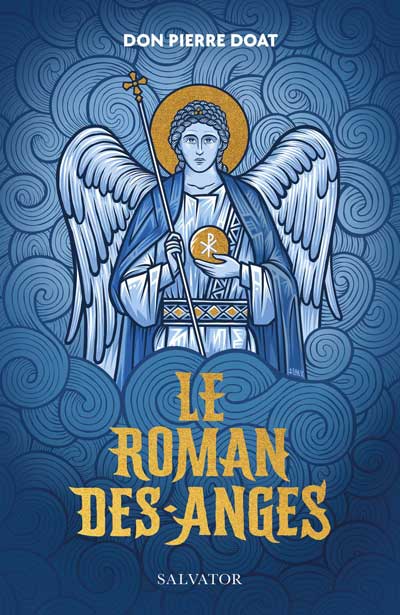
📖 Le Roman des anges,
don Pierre Doat, éditions Salvator, 2024.

📖 Stratégie des anges,
don Pierre Doat, éditions Salvator, 2025.

